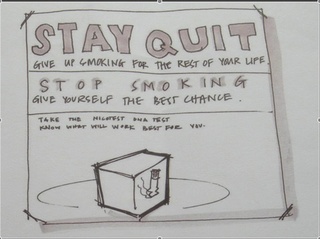In this fourth workshop, the pairs of service design enterprises and science and technology enterprises who have worked together since January gave their final presentations to the wider project group of management researchers, design researchers, design practitioners and entrepreneurs. A very brief summary is given below.
All the design consultancies were asked to do six days' work with their paired enterprise, focussing on service design within the enterprise, deciding together how to make use of the time. The consultancies all commented that the structure of the project forced them to work differently than they ordinarily would with clients - less time to understand the client, little opportunity for iterating ideas, and having to select very few ideas to develop. Nonetheless it was striking how quickly they were able to get to grips with understanding an enterprise and its science and technology - and all three enterprises said they found the work done for them of value.
Radarstation (design company) and Oxford Gene Technology (science enterprise - mico-arrays for research)
Radarstation interviewed three of OGT's customers/ex-customers and analysed the service process they experienced. From this and their visit to OGT, they generated insights which they then used to suggest improvements to the service 'touchpoints' through which customers experienced OGT's service. Questions raised about this encounter included: to what extent a 'design-led' approach differed from that of an operations or marketing consultancy, rooted in management thinking?
IDEO (design company) and Prosonix (science enterprise - particle engineering)
One of the IDEO designers joined a customer visit and shadowed the encounter between Prosonix's sales manager and a potential client. This, and their own visit to Prosonix, lead to IDEO developing insights into Prosonix's service. Following opportunity mapping, IDEO and Prosonix developed a suite of eight ideas which could form a tool kit for Prosonix within their sales and service process. IDEO developed two of these into prototypes - one involving fake adverts suggesting future uses of Prosonix's technology ('adcepts') and the other a prototype dossier, a tool for the sales manager. Questions included one about the role of simple visual metaphors in IDEO's projects, including this one - it was striking how both IDEO designers and the Prosonix sales manager repeatedly made use of a metaphor developed in one of their workshops, to make sense of and communicate what they were doing.
livework (design company) and G-nostics (science enterprise - personalized medicine)
Visits by livework designers to G-nostics and to a pharmacy offering their Nico-Test service, was followed by opportunity mapping based on a review of the existing service - physical and digital. The designers then created their own flow diagram focussed on the customer experience of using Nico-Test. Livework then sketched ideas which improved existing artefacts or suggested new ones (see the photo).
A fourth pair project will take place over the summer.
Academic feedback on these presentations included questions and comments such as
- the way all three projects seemed rooted in 19th-century models of 'product' and 'service' assuming binomial relations between service provider and service consumer, ignoring the networks within which such relations are instantiated
- the extent to which all three design companies offered a similar approach - a fluid process, a focus on customer experiences, journeys and touchpoints, and the role of prototyping
- how design-led innovation relates to ideas of disruptive innovation.
Each of these encounters has been documented with video and the Oxford research team will now draw on the video, interviews with the participants, and the artefacts created during the design process, to assemble publishable outputs which will examine how participants understand 'service design' and how, or if, this changed during the project.
The workshop ended with a special dinner, to which we also invited full-time and executive MBA students from Said Business School, as well as a wider group of service design professionals and managers. Three guest speakers offered provocative and stimulating perspectives on service design and innovation - Jim Spohrer, who leads IBM's development of Services Science and heads the company's Alamaden Research Centre; Ije Nwokorie who leads the service design practice at branding consultancy Wolff Olins; and Chris Voss from London Business School. In their talks, the speakers reminded us how little is understood about service innovation - increasingly evident as a knowledge gap especially in developed economies in which services dominate. Chris Voss drew on his recent research report written with Leonieke Zomerdijk into experience-based services which found 'silent design' within service innovation.

Comments